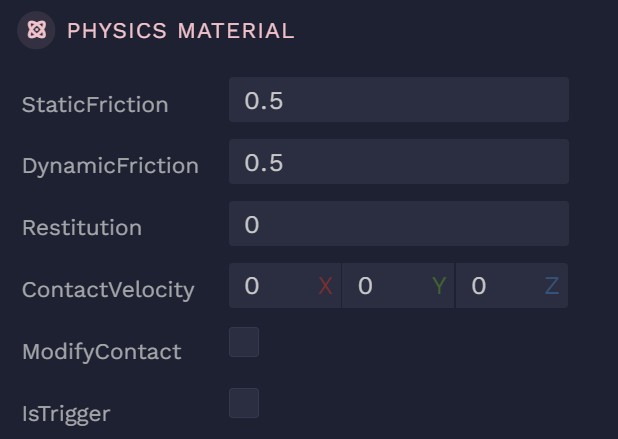Physics Material
Whether you want to create a static, rigid body, kinematic rigid body, or character controller, one thing is true:
The values set in this component help determine how the physics body will react during collision.
For example, when a physics body collides with another the average of their physics material values (e.g. static friction, dynamic friction, restitution) will be used to resolve the collision.

contactVelocity
Vector3(m/s)
Default:[0,0,0]
Applied contact velocity offset when colliding (m/s). Only used if modifyContact is true.
Applied contact velocity offset when colliding (m/s). Only used if modifyContact is true.
dynamicFriction
Float
Default:0.5
Dynamic (kinetic) friction coefficient (typically 0..1). If greater than staticFriction, staticFriction is clamped up to match. Effective value is averaged with the other surface.
Dynamic (kinetic) friction coefficient (typically 0..1). If greater than staticFriction, staticFriction is clamped up to match. Effective value is averaged with the other surface.
isTrigger
Boolean
Default:false
Treat associated geometry as a trigger (generates events but no physical response).
Treat associated geometry as a trigger (generates events but no physical response).
modifyContact
Boolean
Default:false
Enable contact modification (applies contactVelocity on collisions).
Enable contact modification (applies contactVelocity on collisions).
restitution
Float
Default:0
Restitution (bounciness) in [0,1]. 0 = no bounce; 1 = perfectly elastic. Effective value is averaged with the other surface.
Restitution (bounciness) in [0,1]. 0 = no bounce; 1 = perfectly elastic. Effective value is averaged with the other surface.
staticFriction
Float
Default:0.5
Static friction coefficient (typically 0..1). 0 feels like ice; higher resists start of motion. Effective value is averaged with the other surface.
Static friction coefficient (typically 0..1). 0 feels like ice; higher resists start of motion. Effective value is averaged with the other surface.
For further information on the modifyContact and contactVelocity attributes, refer to Contact Velocity.